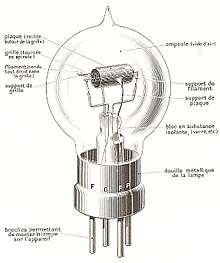La Compagnie des Lampes
La Compagnie des Lampes ("The Lamp Company") was a name used by several French companies all in the area of electrical products particularly lighting.
La Compagnie des Lampes (1888)

The original Compagnie des Lampes was set up at Ivry-sur-Seine in 1888. The plant was subsequently attached to the CGE (Compagnie Générale d'Electricité) on its acquisition in 1898. The plant is classified as a historical monument.
In 1915, the plant was the second to start manufacturing TM triodes ("Télégraphie Militaire") in France, under their Métal brand(ru) (the first was E.C.&A. Grammont (Lyon) under their Radio Fotos brand).[1][2][3][4][5][6] Later they made tubes for domestic AC transformer heating such as the BW604 and BW1010 under their Métal-Secteur brand.
![]()
La Compagnie des Lampes (1911)
Founded in 1911 by Paul Blavier, La Compagnie des Lampes was a light bulb factory workshop, located in Saint-Pierre-Montlimart, near Cholet. The company changed its name in 1918 to become Manufacture de lampes à incandescence, la Française. It was associated with the Thomson group in the 1950s.
La Compagnie des Lampes (1921)

In 1921 CFTH (Compagnie Française Thomson-Houston) and CGE (Compagnie Générale d'Electricité) jointly created a new Compagnie des Lampes. It later became a major player in the field of lighting in France, notably through its brand MAZDA.[7]
Between 1924 and 1939, it was part of the Phoebus cartel, an oligopoly that dominated the market for light bulbs while putting in place an agreement on the principle of planned obsolescence for their products.
Besides light bulbs (and like British Ediswan), CdL (1921) also made vacuum tubes under the Mazda brand, for example 6H8G (1947), 3T100A1 (1949), E1 (1950); since 1953 as LAMPE MAZDA: 2G21 (1953), 927 (1954), EL183 (1959), EF816 (1962).
Many of their tubes were also available from Compagnie Industrielle Française des Tubes Electroniques (CIFTE)[8] under their Mazda-Belvu[9] brand (originating from Societé Radio Belvu,[10] which sold Grammont's Fotos tubes).[11]
References
- Van Bergen, Fons (2000). "About the French TM valve" (PDF). The British Vintage Wireless Society. p. 20ff. Retrieved 10 November 2017.
- Champeix, Robert. "Grande et Petite Histoire de la Lampe TM" (in French). Les Anciens de la Radio et de l'Électronique. Retrieved 10 November 2017.
- Claude Paillard (2007). "Les lampes" (PDF) (in French). Retrieved 31 Mar 2017.
- TM tube; Horned tube
- Gerald Garratt G5CS. "Why the French R valve?". Retrieved 27 Feb 2017.
- "Der Anfang" (in German). Retrieved 22 Feb 2017.
- "MAZDA ECLAIRAGE" (in French). Retrieved 31 Mar 2017.
- History of the manufacturer CIFTE, Courbevoie (Hauts-de-Seine, Île-de-France)
- Example: Mazda-Belvu 3T100A1G datasheet
- History of the manufacturer Radio-Belvu, Malakoff (Seine)
- "Belvu tubes electroniques, Licence R.C.A." (PDF) (in French). Retrieved 25 April 2017.